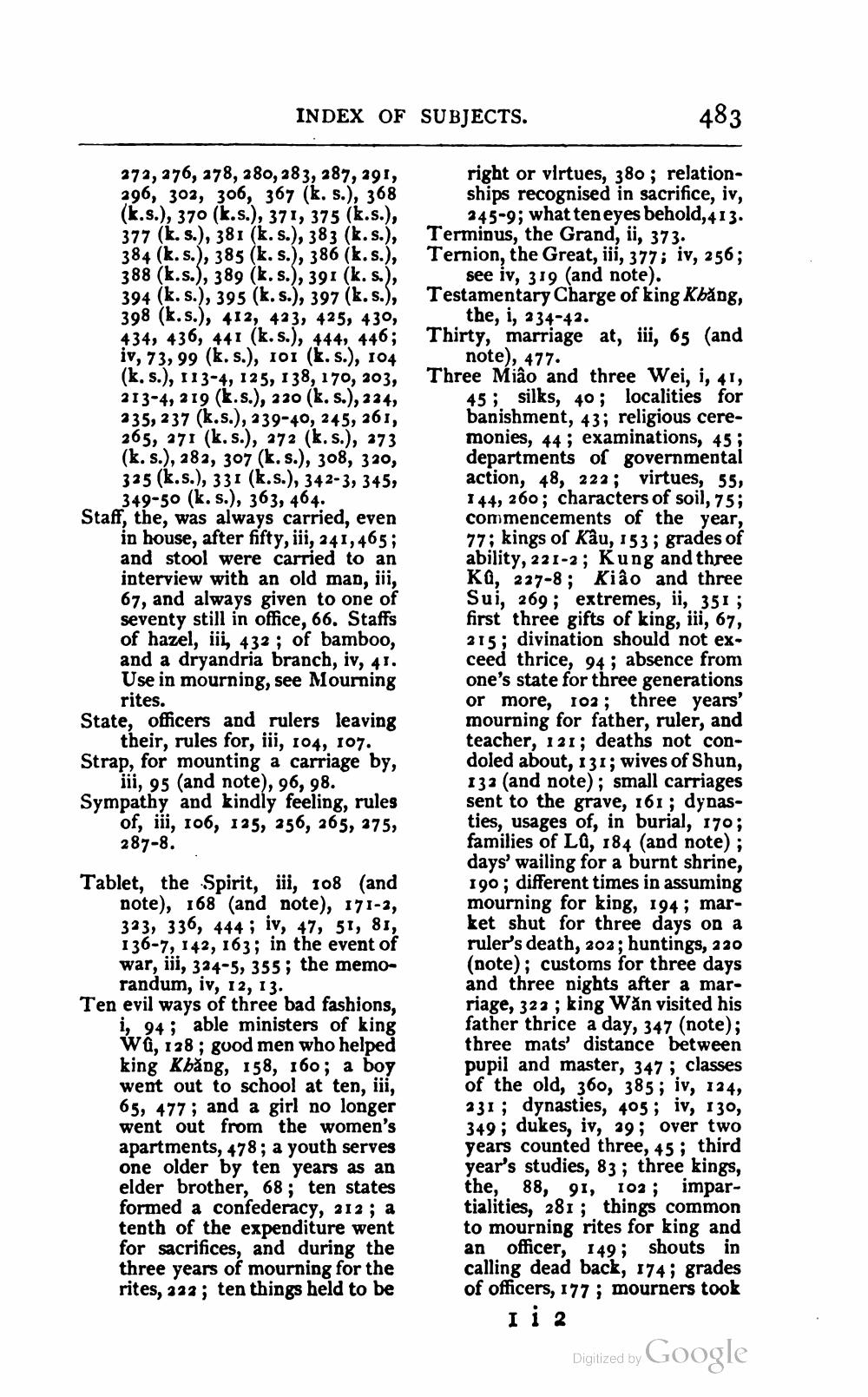________________
INDEX OF SUBJECTS.
272, 276, 278, 280, 283, 287, 291, 296, 302, 306, 367 (k. s.), 368 (k.s.), 370 (k.s.), 371, 375 (k.s.), 377 (k. s.), 381 (k. s.), 383 (k.s.), 384 (k.s.), 385 (k. s.), 386 (k.s.), 388 (k.s.), 389 (k. s.), 391 (k. s.), 394 (k. s.), 395 (k. s.), 397 (k. s.), 398 (k.s.), 412, 423, 425, 430, 434, 436, 441 (k. s.), 444, 446; iv, 73, 99 (k. s.), 101 (k. s.), 104 (k. s.), 113-4, 125, 138, 170, 203, 213-4, 219 (k.s.), 220 (k. s.), 224, 235, 237 (k.s.), 239-40, 245, 261, 265, 271 (k. s.), 272 (k. s.), 273 (k. s.), 282, 307 (k. s.), 308, 320, 325 (k.s.), 331 (k.s.), 342-3, 345, 349-50 (k. s.), 363, 464. Staff, the, was always carried, even in house, after fifty, iii, 241,465; and stool were carried to an interview with an old man, iii, 67, and always given to one of seventy still in office, 66. Staffs of hazel, iii, 432; of bamboo, and a dryandria branch, iv, 41. Use in mourning, see Mourning rites.
State, officers and rulers leaving their, rules for, iii, 104, 107. Strap, for mounting a carriage by,
iii, 95 (and note), 96, 98. Sympathy and kindly feeling, rules of, iii, 106, 125, 256, 265, 275, 287-8.
Tablet, the Spirit, iii, 108 (and
note), 168 (and note), 171-2, 323, 336, 444; iv, 47, 51, 81, 136-7, 142, 163; in the event of war, iii, 324-5, 355; the memorandum, iv, 12, 13.
483
right or virtues, 380; relationships recognised in sacrifice, iv, 245-9; what ten eyes behold,413. Terminus, the Grand, ii, 373. Ternion, the Great, iii, 377; iv, 256; see iv, 319 (and note). Testamentary Charge of king Khăng, the, i, 234-42.
Ten evil ways of three bad fashions, i, 94; able ministers of king Wa, 128; good men who helped king Kbăng, 158, 160; a boy went out to school at ten, iii, 65, 477; and a girl no longer went out from the women's apartments, 478; a youth serves one older by ten years as an elder brother, 68; ten states formed a confederacy, 212; a tenth of the expenditure went for sacrifices, and during the three years of mourning for the rites, 222; ten things held to be
Thirty, marriage at, iii, 65 (and note), 477.
Three Miâo and three Wei, i, 41,
45; silks, 40; localities for banishment, 43; religious ceremonies, 44; examinations, 45; departments of governmental action, 48, 222; virtues, 55, 144, 260; characters of soil, 75; commencements of the year, 77; kings of Kâu, 153; grades of ability, 221-2; Kung and three Kû, 227-8; Kiâo and three Sui, 269; extremes, ii, 351; first three gifts of king, iii, 67, 215; divination should not exceed thrice, 94; absence from one's state for three generations or more, 102; three years' mourning for father, ruler, and teacher, 121; deaths not condoled about, 131; wives of Shun, 132 (and note); small carriages sent to the grave, 161; dynasties, usages of, in burial, 170; families of Lû, 184 (and note); days' wailing for a burnt shrine, 190; different times in assuming mourning for king, 194; market shut for three days on a ruler's death, 202; huntings, 220 (note); customs for three days and three nights after a marriage, 322; king Wăn visited his father thrice a day, 347 (note); three mats' distance between pupil and master, 347; classes of the old, 360, 385; iv, 124, 231; dynasties, 405; iv, 130, 349; dukes, iv, 29; over two years counted three, 45; third year's studies, 83; three kings, the, 88, 91, 102; impartialities, 281; things common to mourning rites for king and an officer, 149; shouts in calling dead back, 174; grades of officers, 177; mourners took
I i 2
Digitized by
Google




